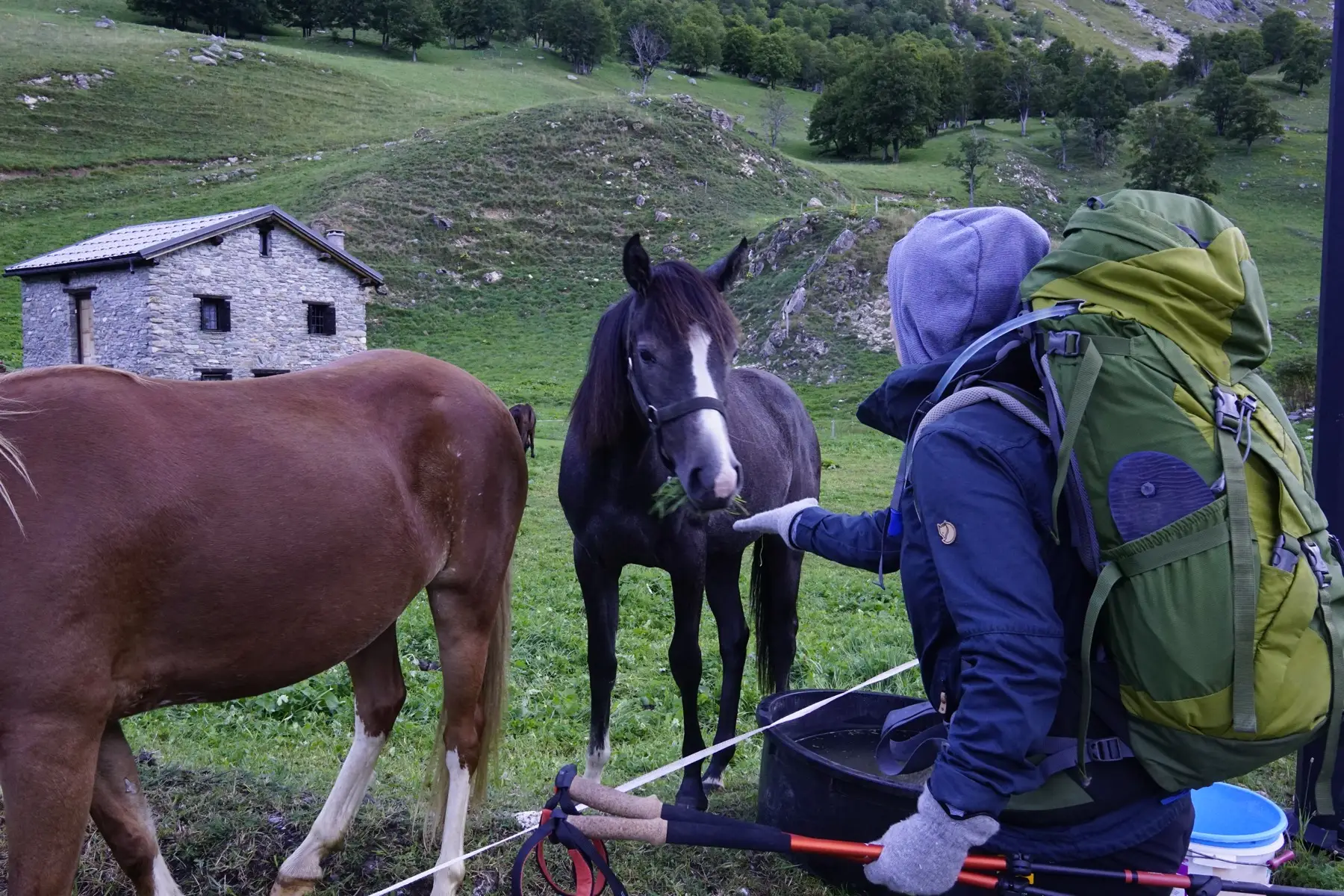The Tour of Mont Blanc (TMB): Equipment
Clothes, Gear, and Consumables
September 1, 2020

Table of Contents
This blog post is part of a series.
Our goal was to not exceed a total weight of ten kilograms for the backpack. With the water, we both reached between 11 kg and 13 kg. You’ll have to make decisions. We went with a 50+10 liters backpack. We already had them, and the size ended up being perfect for the stuff we packed.
If you’re doing only six days walking (half of the TMB), which seems like the usual plan for families with kids, you can probably fit everything in a 35 liters backpack.
If you’re all about speed and don’t care much about wearing a limited number of clothes, or having an umbrella, or bigger camera, or sleeping bag, it’s definitely possible to go lightweight.
Clothing
Here’s the list of clothes I am bringing on the trek. You’ll find the weight of each item(s) that will be in my pack.
| Item | Weight (kg) |
|---|---|
| Waterproof Hiking Boots | 0.45 |
| Thick Socks (7) | 0.46 |
| Waterproof Jacket or Poncho | 0.17 |
| Warm Fleece | 0.43 |
| T-Shirts (6) | 0.85 |
| Hiking Pants (1) | 0.54 |
| Hiking Belt | 0.10 |
| Trail Running Shorts (3) | 0.50 |
| Warm Baselayer (1) | 0.20 |
| Warm Midlayer (1) | 0.28 |
| Technical Underwear (5) | 0.33 |
| Warm Long Sleeve Shirt for Evenings (1) | 0.18 |
| Long Sleeve Shirt for Evenings (1) | 0.18 |
| Warm Bottoms for Evenings (1) | 0.16 |
| Winter Hat | 0.10 |
| Winter Gloves | 0.05 |
| Sunhat | 0.09 |
| Sandals | 0.11 |
The total weight on my back will be a little lower than the sum above, though, because I am wearing clothes every day. In retrospect, I believe I could have skipped the pair of pants (I prefer to wear shorts even in bad weather) and one or two t-shirts (and wash the one I had during the walk).
Gear
As for gear, here’s the list. Again, you’ll find the weight of each item(s).
| Item | Weight (kg) |
|---|---|
| Trekking Poles (pair) | 0.53 |
| Sunglasses (with protective case) | 0.13 |
| Water Bag (and 2 litres water) | 2.17 |
| Compass | 0.04 |
| Umbrella | 0.38 |
| Whistle (Metal) | 0.03 |
| Knife with Whistle | 0.06 |
| Smartwatch | 0.06 |
| Headlamp | 0.09 |
| Extra Batteries (7) | 0.09 |
| Power Bank | 0.38 |
| Camping Pillow | 0.19 |
| Sleep Mask | 0.05 |
| Sleeping Bag Liner | 0.14 |
| Sleeping Bag | 0.67 |
| Backpack | 2.22 |
| Backpack Rain Cover | 0.13 |
| Organising Packs | |
| Toothbrush | |
| Phone | 0.17 |
| Camera | 0.53 |
| e-Reader | 0.30 |
| Charger(s) | |
| ID Card or Passport, Swiss B Permit | - |
| Wallet with Enough Cash and Credit/Debit Cards | 0.12 |
| Insurance Card (and Rega for Swizterland) | - |
| Guide Book | 0.36 |
| Micro Fiber Towel |
Note that the trekking poles or watch, for example, should be in use, and not stowed in or out of the backpack. Water level will decrease during the day. Absolute backpack weight is therefore lower.
Consumables
I consider consumables items that will at one point be empty and will need to be refilled, excluding items that are part of the first aid kit (see below).
| Item | Weight (kg) |
|---|---|
| Suncream (30+) | 0.24 |
| Emergency Food | 0.25 |
| Hand Sanitiser | 0.50 |
| Shower Gel and Shampoo, Soap | |
| Toothpaste | |
| Floss | - |
| Earplugs | - |
| Anti-Chafe Balm | 0.07 |
| Masks (for COVID-19) |
I am trying to go for smaller sizes here to lower the weight. I expect to be able to buy more en route if needed, for example in Courmayeur.
First Aid Kit
More important than the First Aid Kit is actual first aid training. I highly recommend taking first aid lessons at your workplace or with an accredited organization such as the Red Cross or the Samaritains (in Switzerland). Make sure you are insured for evacuation, always check the weather forecast before leaving in the morning, and don’t take unnecessary risks. Mountains are unforgiving.
- Emergency Blanket
- Antiseptic Wipes and Cream
- Plasters
- Compeed
- Sterile Dressings
- Safety Pins
- Compression Bandage
- Tweezers
- Scissors
- Arnica Cream, Tiger Balm, or Similar
- Oral Rehydration Therapy
- Nitrile Gloves
- Saline Solution
- Anti-Cramps Solution
- Painkillers
Don’t forget to have emergency phone numbers in your phone or in your mind. In case you don’t, you can always remember 112, it’s the European emergency line. There are also apps for your phone that will send your (exact) satellite location. Each country has its own but it should work across borders. For Switzerland, check the Rega.